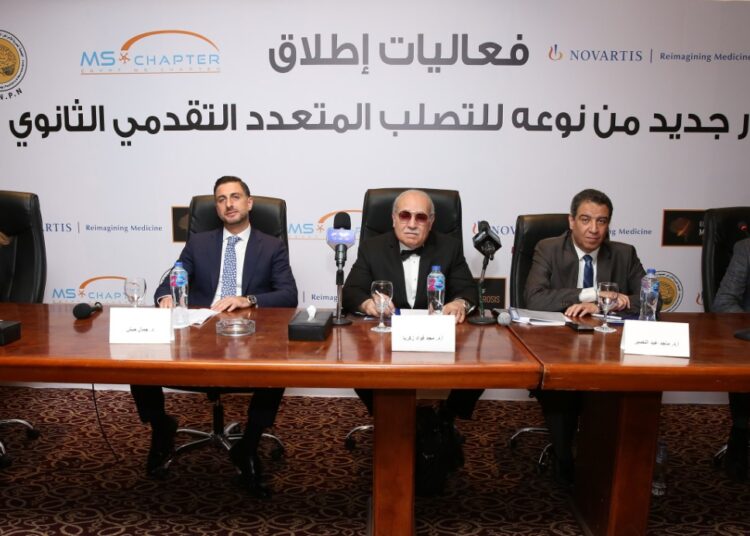Novartis Pharma S.A.E (Novartis Egypt) today announced the launch of a novel treatment indicated for adult patients in Egypt with secondary progressive multiple sclerosis (SPMS). The event took place in cooperation with the MS Chapter of the Egyptian Society of Neurology Psychiatry and Neurosurgery (E.S.N.P.N) and the Egyptian Society of MS to raise the community’s awareness of this novel treatment that has shown effectiveness in delaying disease deterioration for SPMS patients.
“MS has been categorized as the most common immunological demyelinating disease to affect the central nervous system.2 It is characterized by inflammatory and neurodegenerative processes leading to compromised vision, disability and cognitive impairment,”1 said Dr. Magd Fouad Zakaria, Professor of Neurology at Ain Shams University and President of the Egyptian Society of MS. “Given its progressive nature, almost 60% of people with MS require walking assistance within 20 years of disease onset.3 Our experience – and the global consensus –is that a timely diagnosis, early treatment and innovative therapies can reduce the disabling progress of the disease2, allowing patients to lead as normal a life as possible, for as long as possible.”
Prof. Dr. Magd Fouad Zakaria added, “Healthcare for MS patients has undergone significant development since the Egyptian government’s decision to bear the costs of treatment in 2015. Intense efforts have been made to improve the diagnosis and management of cases, including the establishment of medical MS units, which began as central units and were then expanded to cover the entire country. This has contributed to the achievement of a fundamental transformation in MS treatment in Egypt and to providing appropriate healthcare services for patients.
The government’s decision to support the expenditures of disease-modifying drugs (DMDs), establish MS units, and implement MS case registration and develop statistics for the disease in Egypt, as well as participate in global clinical trials and publish research in specialized medical journals, has led to unanimous praise by specialists treating the disease. It has helped underline the importance of early diagnosis in MS and the comprehensive management of cases. This has led to the system of MS diagnosis and treatment of in Egypt becoming not only is one of the most successful systems in the entire region, but demonstrated that it able to compete with the highest global standards, establishing it as a unique example to follow for countries seeking to develop their diagnostic and treatment systems.
“MS can be segmented into relapsing-remitting multiple sclerosis (RRMS), secondary progressive multiple sclerosis (SPMS) and primary progressive multiple sclerosis1. Our focus today is on SPMS,” said Dr. Maged Abdel Naseer, Professor of Neurology at Cairo University, Head of the MS Chapter and Head of the Pan Arab Union of Neurological Societies. “SPMS patients represents 20% of total MS patients in Egypt, , and although every patient’s MS journey is unique, up to 40% of RRMS patients will eventually transition to SPMS within six to 10 years of RRMS onset.5 It is essential to recognize this hard-to-detect, silent progression during RRMS4.”
“The EXPAND study was the first large trial of any disease-modifying therapy (DMT) to demonstrate superiority over a placebo in a representative population of patients with SPMS11.
The trial showed that siponimod was able to reduce the risk of confirmed disability progression and demonstrated the sustained effect of continuous treatment in delaying disability for up to five years in patients with SPMS.” 11,12,13,14 said Dr. Maged added.
“MS does not only represent a burden on patients and caregivers; as a relatively ‘young’ disease, with an average age of onset of 20 to 40 it has a significant impact on society as a whole2. Novartis has been committed to supporting MS patients in different disease stages, with a legacy that extends for nearly 10 years since the launch of the first HET for RRMS patients. We have since supported more than 5000 Egyptian patients and counting.20 Today, the newly-introduced treatment represents hope for SMPS patients who, until now, did not have a treatment”19 said Jamal Habash, Novartis Egypt CPO Head. “Novartis remains committed to reimagining medicine for people living with MS as we pioneer the delivery of innovative treatments that improve the lives of patients worldwide.”
“We aspire that this new hope for SPSM treatment can help change the conversation about progressing MS and expand possibilities for patients and their caregivers. We are working closely with all stakeholders to ensure that eligible Egyptian patients can benefit from this treatment as quickly as possible,” said Gehan Ramadan, Novartis Egypt Chief Scientific Officer. “In addition to this novel treatment, Novartis has a long legacy in innovative treatments for MS, with available treatments for adult patients with MS, whether their disease is relapsing-remitting or secondary progressive.”
“We are committed to open dialogue with all our stakeholders, who are key partners in our decision-making throughout the medicine’s lifecycle, helping us to develop better medicines for patients with unmet needs,” said Karim Youssef, NeuroScience and Ophthalmology Franchise Head at Novartis Egypt. “We are committed to being a key strategic partner in supporting the MS community in Egypt, whether through raising community and patients’ awareness around the disease or further collaboration with the healthcare society.”
“In collaboration with physicians and patient societies, Novartis has developed clinically validated tools to help in the early detection of active SPMS, and to facilitate a dialogue around any potential changes in the patient’s experience with their MS through various patient support programs, as well as familiarizing patients with the process of drug onboarding and administration and follow-up testing,” he added.






Discussion about this post